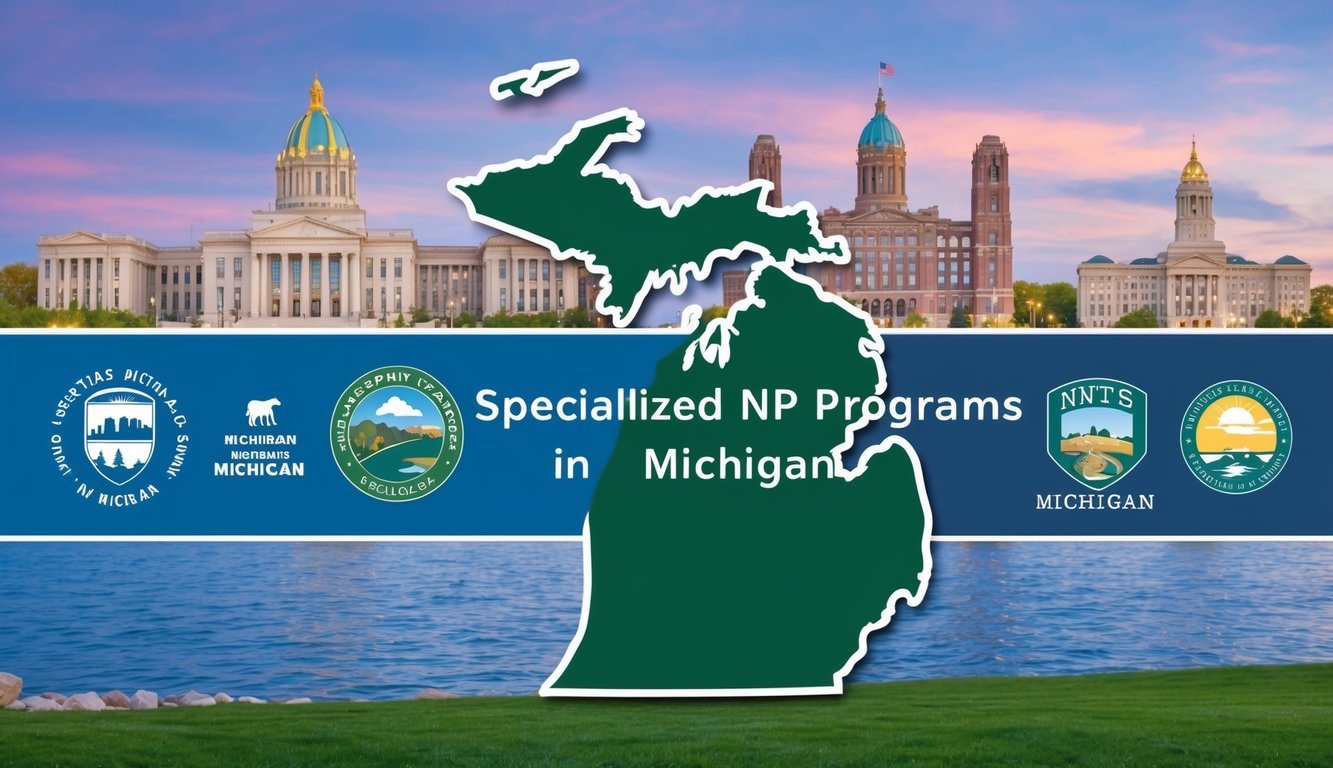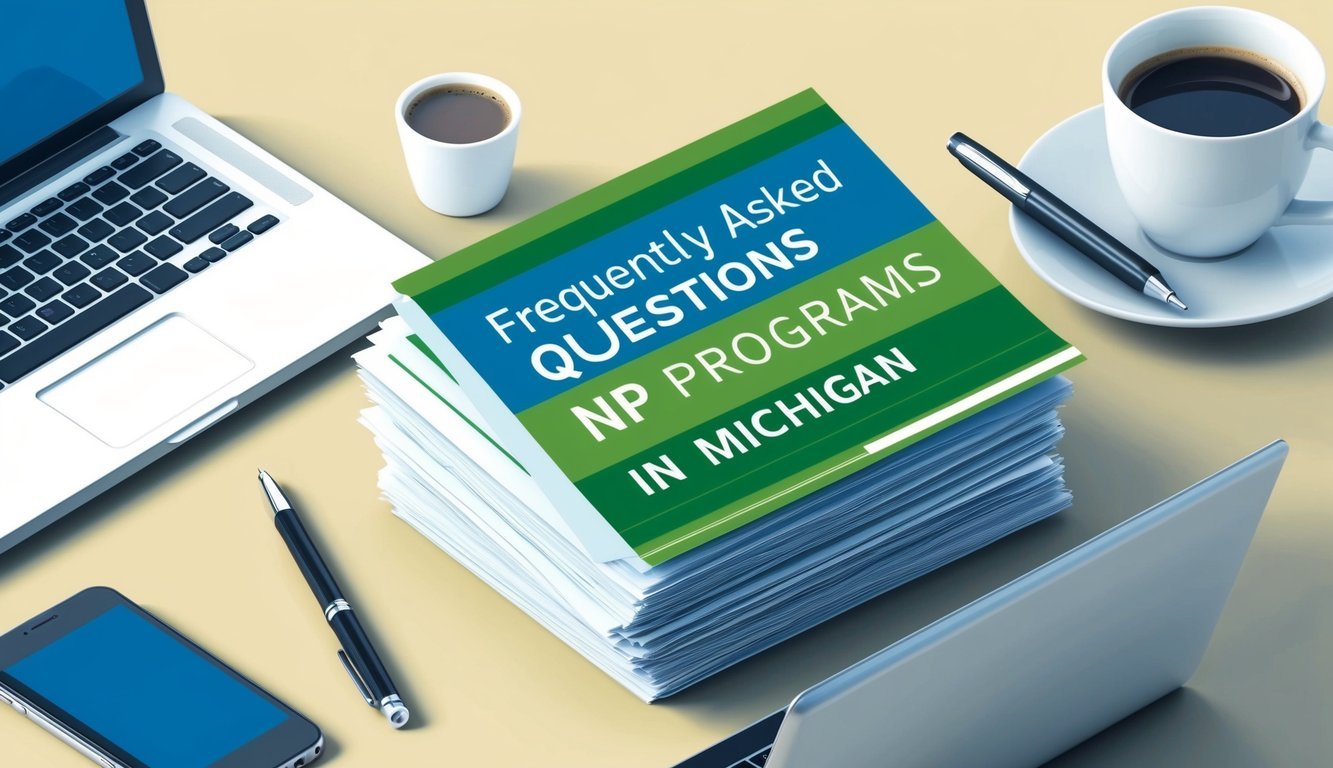Nurse practitioner programs in Michigan offer a path to a rewarding healthcare career.
These programs prepare you to provide primary care services across the lifespan.
They equip you with the skills needed to make a difference in patients’ lives.
With both Master of Science in Nursing (MSN) and Doctor of Nursing Practice (DNP) options available, you have the flexibility to choose a program that best suits your career goals.
In Michigan, you can find several specialized NP programs that focus on different areas of health care, including family practice, pediatrics, and more.
These programs not only cover essential clinical requirements but also emphasize academic learning and professional development, helping you grow as a healthcare provider ready to meet community needs.
As you explore the top NP programs in Michigan, keep in mind the career outcomes awaiting you.
Many graduates find fulfilling roles in various healthcare settings, playing crucial roles in improving health outcomes and enhancing patient care.
Key Takeaways
- Nurse practitioner programs in Michigan prepare you for primary care across the lifespan.
- Specialized programs focus on different areas of health care to match your interests.
- Graduates enjoy diverse career opportunities and contribute to better community health.
Overview of Nurse Practitioner Programs in Michigan

Nurse Practitioner (NP) programs in Michigan offer various educational pathways to help you achieve your career goals in the healthcare field.
Understanding the requirements for licensing and certification, as well as the importance of accreditation, is essential for prospective students.
Educational Pathways
In Michigan, you can pursue several educational pathways to become a Nurse Practitioner.
The most common route is obtaining a Master of Science in Nursing (MSN) degree, which typically takes around two to three years.
Some programs also offer a Doctor of Nursing Practice (DNP) option, which requires additional coursework and extends the timeline to about three to four years.
Many universities offer specialized NP tracks, such as Family Nurse Practitioner or Adult-Gerontology Nurse Practitioner.
These programs not only equip you with clinical skills but also prepare you for leadership roles in healthcare settings.
Online and hybrid formats are available, providing flexibility for working professionals.
Licensing and Certification
After completing your educational program, you must obtain a license to practice as a Nurse Practitioner.
You will need to pass a national certification exam.
Two major organizations offer certification: the American Nurses Credentialing Center (ANCC) and the American Association of Nurse Practitioners (AANP).
Each organization has its own requirements, so it’s important to choose the exam that aligns with your career goals.
Additionally, you must apply for a state license in Michigan, which has its own set of requirements.
Maintaining your license involves ongoing education to ensure you stay updated with the latest practices in nursing.
Accreditation and Institutional Reputation
Accreditation is vital in ensuring that your NP program meets high educational standards.
Programs accredited by organizations like the Commission on Collegiate Nursing Education (CCNE) or the Accreditation Commission for Education in Nursing (ACEN) are preferred.
You should assess institutional reputation by looking at graduation rates, job placement rates, and student feedback.
Attending a well-regarded program can enhance your employment opportunities and increase your earning potential.
Research schools like the University of Michigan and Michigan State University, known for their strong NP offerings and community connections.
Specialized NP Programs

In Michigan, specialized nurse practitioner programs offer focused training to meet diverse healthcare needs.
You can choose from Family Nurse Practitioner (FNP), Psychiatric Mental Health Nurse Practitioner, and Adult-Gerontology Nurse Practitioner programs.
Each specialization prepares you for unique roles in patient care.
Family Nurse Practitioner (FNP) Programs
Family Nurse Practitioner programs prepare you for comprehensive and continuous patient care across all ages.
These programs focus on health promotion, disease prevention, and management of chronic conditions.
Key components of FNP programs include:
- Curriculum: You will study topics like pharmacology, pathophysiology, and advanced health assessment.
- Clinical Experience: Expect hands-on training in diverse settings, like family practices and community clinics.
- Certification: After completing your program, you can pursue certification through the American Association of Nurse Practitioners (AANP).
A prominent institution offering FNP training is the University of Michigan – Flint.
Psychiatric Mental Health Nurse Practitioner Programs
Psychiatric Mental Health Nurse Practitioner (PMHNP) programs focus on mental health assessment, diagnosis, and treatment.
As a PMHNP, you will address psychiatric disorders and promote mental wellness for patients of all ages.
Important aspects of PMHNP programs include:
- Course Topics: You will cover areas such as psychopharmacology, mental health nursing theories, and therapeutic communication.
- Clinical Rotations: Training often includes placements in psychiatric hospitals, outpatient clinics, and community health organizations.
Programs like those offered at University of Michigan can provide the necessary education and experience.
Adult-Gerontology Nurse Practitioner Programs
Adult-Gerontology Nurse Practitioner programs train you to care for adult patients, focusing on both acute and chronic health issues.
This specialization is crucial as the adult population continues to grow.
Key features of Adult-Gerontology NP programs include:
- Curriculum Design: Courses include adult health assessment, gerontology, and chronic disease management.
- Clinical Practice: Experience in settings like hospitals, long-term care facilities, and outpatient clinics is essential.
An example of a reputable program is at NPP Programs, which highlights the various options available in Michigan.
Clinical and Academic Requirements

When pursuing nurse practitioner programs in Michigan, understanding the clinical and academic requirements is vital.
These requirements often involve a structured curriculum alongside extensive clinical experiences.
Curriculum and Competencies
The curriculum for nurse practitioner programs focuses on essential nursing knowledge and skills.
You will engage in courses covering advanced health assessment, pharmacology, and pathophysiology.
Key Competencies:
- Health Promotion: Understanding preventative care strategies.
- Disease Management: Learning to manage chronic illnesses.
- Clinical Judgment: Developing the ability to make sound decisions in patient care.
Most programs require you to complete a minimum of 50-75 credit hours, depending on whether you pursue a Master of Science in Nursing (MSN) or a Doctor of Nursing Practice (DNP).
This robust curriculum prepares you for the challenges of clinical practice.
Clinical Practicum and Decision Making
Clinical practicums are a crucial part of your training.
These placements allow you to apply what you’ve learned in real healthcare settings.
Programs require around 500-750 clinical hours for MSN students and up to 1,000 hours for DNP students.
During your clinical experiences, you will:
- Participate in patient assessments.
- Create care plans.
- Make clinical decisions that affect patient outcomes.
Your ability to use clinical judgment will be tested as you encounter diverse patient needs.
It’s vital to be prepared for these situations, as they will play a significant role in your future practice.
Schools like the University of Michigan and Michigan State University provide tailored clinical placements to enhance your learning experience.
Michigan’s Top NP Programs
Michigan offers several excellent Nurse Practitioner (NP) programs.
These programs provide the training you need to excel in various healthcare settings.
Below are details about some of the leading schools where you can pursue your NP education.
University of Detroit Mercy
The University of Detroit Mercy (UDM) has a strong nursing program that focuses on family nurse practitioner (FNP) training.
UDM provides both a Master of Science in Nursing (MSN) and a Doctor of Nursing Practice (DNP) degree.
The curriculum emphasizes hands-on clinical experiences.
This allows you to gain practical skills while engaging with patients in real-world environments.
Furthermore, UDM’s program is known for its commitment to community health and compassionate care.
The faculty is experienced and dedicated to guiding you through your educational journey.
University of Michigan School of Nursing
The University of Michigan School of Nursing is recognized nationally for its exceptional NP programs.
It offers various pathways, including MSN and DNP options, focusing on family practice, pediatric care, and more.
The program features a blend of innovative coursework and extensive clinical practice.
With top-notch faculty and resources, you will receive comprehensive education.
Additionally, online options are available for certain programs, making it easier to balance your studies with personal commitments.
Learn more about their offerings at the University of Michigan School of Nursing.
Saginaw Valley State University
Saginaw Valley State University (SVSU) provides an MS in Nursing with a focus on family nurse practitioners.
This program is designed for registered nurses looking to advance their careers.
SVSU combines theoretical knowledge with practical experiences, preparing you for various healthcare situations.
The faculty is supportive, and the program fosters a collaborative learning environment.
Furthermore, the school offers access to state-of-the-art simulation labs to refine your clinical skills.
Check out more about their program at SVSU College of Nursing.
Spring Arbor University
Spring Arbor University (SAU) has a growing NP program that offers both MSN and DNP degrees.
Their approach integrates faith and learning into the healthcare curriculum, which can appeal to those seeking a values-based education.
Programs at SAU focus on developing your clinical competencies and leadership skills.
The smaller class sizes foster personalized learning, allowing for closer interaction with faculty.
Additionally, SAU provides flexible scheduling options to accommodate working professionals.
Northern Michigan University
Northern Michigan University (NMU) offers an MSN program with a specialization in FNP.
This program highlights a community-oriented approach to health care, ensuring that you are well-versed in various patient populations.
You will participate in clinical rotations that prepare you for real-world challenges.
NMU’s faculty brings diverse expertise, enriching your educational experience.
The program utilizes advanced technology and resources to enhance learning and skill development.
For more details, visit the Northern Michigan University.
Career Outcomes and Professional Development

Pursuing a Nurse Practitioner (NP) program in Michigan opens various career paths for you.
Graduates often find roles in primary care, specialized clinics, and public health organizations.
Career Opportunities
| Role | Description |
|---|---|
| Primary Care Provider | Deliver essential health services to patients. |
| Public Health Nurse | Focus on community health promotion and education. |
| Acute Care NP | Provide specialized care in urgent settings. |
As an NP, you play a key role in health promotion.
You assess patient needs, develop care plans, and implement strategies to improve health outcomes.
Your education equips you with advanced practice skills and knowledge of the public health code.
Michigan’s NP programs also emphasize nursing education.
This helps you stay current with best practices and policies in the field.
Continuous professional development is crucial for success.
You may want to conduct a gap analysis to identify areas for improvement in your practice.
This allows you to focus your learning on skills that enhance your capabilities as a healthcare provider.
Joining professional organizations and attending workshops can also support your career.
These resources keep you informed about new trends and research in healthcare.
Use helpful platforms to connect with peers and explore further educational opportunities.
Frequently Asked Questions

This section addresses common questions related to Nurse Practitioner programs in Michigan.
You will find specific insights about top-ranked programs, educational requirements, duration, admission criteria, costs, and in-demand specializations.
What are the top-ranked Nurse Practitioner programs in Michigan?
The top-ranked Nurse Practitioner programs in Michigan include those at the University of Michigan – Ann Arbor and the University of Michigan-Flint.
Both schools offer a variety of advanced degrees and have strong clinical training components.
What are the educational requirements for the University of Michigan’s Nurse Practitioner program?
To enroll in the University of Michigan’s Nurse Practitioner program, you typically need a Bachelor of Science in Nursing (BSN).
Additionally, prospective students must hold a valid nursing license in Michigan and submit GRE scores, depending on the specific program track chosen.
How long is the typical duration for completing a Nurse Practitioner program in Michigan?
Most Nurse Practitioner programs in Michigan take between two to four years to complete.
Programs offering a Master of Science in Nursing (MSN) usually require two years, while Doctor of Nursing Practice (DNP) programs may take up to four years, depending on part-time or full-time status.
What are the admission criteria for Wayne State’s Nurse Practitioner program?
Admission to Wayne State’s Nurse Practitioner program requires a Bachelor of Science in Nursing, an active nursing license, and a minimum GPA.
Some tracks may also require relevant clinical experience and standardized test scores.
How does the cost of Nurse Practitioner education vary among different universities in Michigan?
Tuition costs for Nurse Practitioner programs vary widely among Michigan universities.
For example, public universities like the University of Michigan tend to have lower tuition rates for in-state students compared to private institutions.
Many schools also offer financial aid options.
Which specializations for Nurse Practitioners are most needed in the Michigan healthcare market?
In Michigan, Nurse Practitioners specializing in primary care, geriatrics, and mental health are in high demand.
The healthcare landscape is evolving, and these areas are expected to see continued growth and need for qualified professionals.

